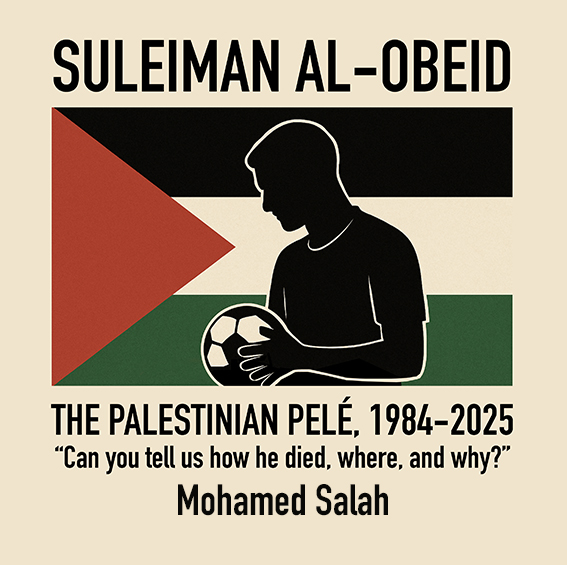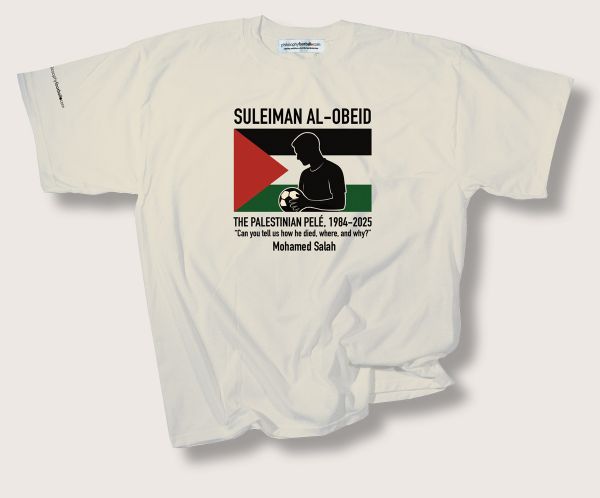
The Meaning of Mo Salah, UEFA and Gaza
16.08.25
Philosophy Football's Mark Perryman welcomes a footballer exposing the truth about Gaza

Following the death of Palestinian footballer Suleiman al-Obeid UEFA tweeted sorrowfully:
“Farewell to Suleiman al-Obeid, the ‘Palestinian Pelé. A talent who gave hope to countless children, even in the darkest of times."
Fair enough, nice of them, many must have thought. Not Mo Salah who with three questions exposed the moral dithering over Gaza not only in football but wider across popular culture, society and politics.
“Can you tell us how he died, where, and why?”
The answers were easy enough to find, the fact UEFA hadn't provided them tells us so very much.
He died, like tens of thousands of others as a result of an Israeli armed assault which was purposefully and lethally indiscriminate. We can argue the toss over whether or not to call this 'genocidal' what is without question is these killings are by no stretch of imagination, or Israeli government denials, accidental. Of course, avoidable tragedies occur in any war, the entire history of warfare is full to overflowing with human tragedy. But such killings on such a scale reveal what is clearly Israeli military policy.
What was Suleiman doing to put himself in such a precarious position? Queuing like thousands of other Palestinians for humanitarian aid. Even being the 'Palestinian Pelé' didn't mean he and his family could avoid such a necessity if they weren't to starve. These aid distribution points are easy enough to identify and ensure free of the gunfire, and worse, all around them. There is a long tradition, originated by the Red Cross, of such sanctuaries in war. Not in Gaza, not from the excesses of the Israeli military.
OK in a tweet UEFA might not have been able to explain all of this. But simply to bid Suleiman 'farewell' tells us plenty, and none to UEFA's credit.
To date authoritative sources have recorded over 60,000 Palestinian deaths at the hands of Israel, including the Palestine FA report over 400 footballers.
The 'darkest of times' well put, but without anything resembling the reason why, the sentiment becomes entirely meaningless.
And Israel has faced no consequences for its actions from FIFA. 'Keep Politics out of Sport' is the well-worn mantra but of course sport, especially international sport, is unavoidably political. Whatever the country the 'national team' represents the nation on a global stage and politics via national identity is entirely indivisible from that. Eric Hobsbawm's words " A nation of millions seems more real as a team of eleven named people" is generally used as a positive, but it is equally applicable as a negative. A point often missed is Hobsbawm wrote those words recounting his experience as a Jewish schoolboy following football during the rise of the Nazis in Austria before he escaped as a refugee. Sport not political? When England played Germany in the 1930s the team were instructed by the FA to give the Nazi salute when they lined up for the anthems. Sport not political? When Tottenham Hotspur hosted England v Germany at White Hart Lane in 1935 the club flew the swastika from the flag pole on the roof of the much-loved East Stand.
Sport has always been used, sometimes more subtly, in such ways. And on occasion FIFA has in turn used its status as football's world governing body to police this too. In 1961 South Africa was banned from international football because of the ruthlessly racist state policy of apartheid. A ban that was dropped in 1963 when the last English President of FIFA, Sir Stanley Rous, following his negotiation that South Africa would field all-white and all-black teams at alternating World Cups. Yes, really. A gross insensitivity to global opinion, particularly in Africa. Rous out-voted, South Africa was suspended in 1965. Two years later in an unprecedented move Rous was deposed, mainly due to African countries' votes, South Africa expelled, a suspension lasted 25 years until the ending of Apartheid. An ending marked by the country's triumphant hosting of World Cup 2010. A happy ending, of sorts, and intensely political.
In 1992 the bitter ethnic conflicts, eventually descending into all-out wars, that accompanied the break-up of Yugoslavia led to the country, despite topping their qualifying group, being suspended on the eve of Euro 92. With just ten days to prepare lucky old Denmark replaced them, going on to win the tournament.Today all the Balkan nations compete independently in UEFA and FIFA competitions, Kosovo the most recent to do so.
Following their hosting of World Cup 2018 Russia after invading Ukraine was banned from both the 2022 and 2026 World Cups. England, Poland and Sweden pre-empted this decision, unilaterally declaring they would refuse to play Russia. The ban continues while both the Ukrainian national team and club teams, despite being mostly in exile, continue to play in both UEFA and FIFA competitions, providing a vital focus of hope and identity for Ukrainians in their war-torn country and as refugees across the world.
Which leaves another question concerning UEFA's tweet. Why is Israel a member of football's European confederation, unlike its neighbours Jordan, Syria, Lebanon and Palestine all members of the Asian confederation (Egypt is a member of the African confederation). A question I've never once heard asked in any football commentary, or raised in a match report, of an Israeli club or the National Team competing in European competitions or World Cup Qualifying. Not once, ever, let alone since the current conflict.
The Israeli FA, the successor organisation to the Palestinian FA which included both Jewish and Arab club sides, joined the Asian Confederation in 1956. And their membership proved successful, Israel was runners-up in the Asian Cup of 1956 and 1960, hosted the tournament in 1964 which they also won. But off the pitch Israel was a site of major conflicts, most notably the 1967 Six-Day War and 1973 Yom Kippur War. As a result, Arab and predominantly Muslim nations more and more refused to play Israel. In 1967 Israel was summarily expelled from the Asian Confederation.
UEFA admitted the Israel National team in 1991, Israeli club sides in 1992 and as a full member in 1994. This is despite Israel not being in any sense a European nation. It was a decision with absolutely nothing to do with events on the pitch and everything to do with events off it. This is an entirely political decision, which neither UEFA nor the attendant football media seem at all willing to admit.
So, should we despair, give up all hope? No, not ever. At the 1972 Olympics this conflict collided with sport in the most tragic of manners. Israeli athletes taken hostage by the Palestinian terrorist group Black September. In the ensuing shoot-out most of the athletes lost their lives, either killed by Black September or in the crossfire with the police sharpshooters. 40 years later Palestine featured again at the Olympics, at London 2012 Palestinian athletes marching for the first time in an Olympic Opening Ceremony behind the Palestinian Flag. For good or bad, sport is always political, given the will the outcomes can be positive not negative. Mo Salah shows us how to shift the balance now, when we need to so much, from the latter to the former. Hope 1 Despair 0.
Philosophy Football's Suleiman al-Obeid & Mohamed Salah T-shirt is available here.
Mark Perryman is the co-founder of the self-styled 'sporting outfitters of intellectual distinction' aka Philosophy Football.
